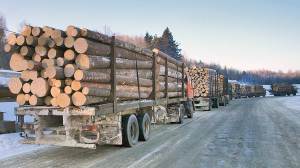 Wood, along with oil and gas, has always occupied an important place in the list of Russia’s natural resources, its main riches. According to the Federal Customs Service, between January and September 2014 the export of timber, cellulose and paper products equaled 2% of the total exported goods, about US$12 billion. Russia has been one of the largest suppliers of raw materials in the global timber market for many years. Despite tightened rules on the export of round (not processed) wood and repeated calls for the development of deep wood processing, the country remains the world’s largest exporter of logs. About half of the exported softwood is pine logs and rough yellow deal-boards, which sells to China. Other major consumers of Russian lumber are Egypt (traditionally the largest importing country of treated wood from Russia), Japan, Great Britain and Germany.
Wood, along with oil and gas, has always occupied an important place in the list of Russia’s natural resources, its main riches. According to the Federal Customs Service, between January and September 2014 the export of timber, cellulose and paper products equaled 2% of the total exported goods, about US$12 billion. Russia has been one of the largest suppliers of raw materials in the global timber market for many years. Despite tightened rules on the export of round (not processed) wood and repeated calls for the development of deep wood processing, the country remains the world’s largest exporter of logs. About half of the exported softwood is pine logs and rough yellow deal-boards, which sells to China. Other major consumers of Russian lumber are Egypt (traditionally the largest importing country of treated wood from Russia), Japan, Great Britain and Germany.
In the forestry, as in many other industries, systemic problems has long been hopelessly entrenched, and no one is in a hurry to resolve these problems. Only 11% of Russian timber is processed into finished products in Russia. The traditional official list of problems for this industry includes the constant increase of costs of fuel and transportation, complicated legal regulations related to the lease and auction of forest resources, and the lack of legal framework governing economic relations with other countries in forest industry.
However, this is only a visible tip of the iceberg. The main problem is a huge informal sector for which data is not captured by customs statistics. The World Wildlife Fund (WWF) estimated that in 2006 more than 50% of the Russian timber imported to China was illegal or of dubious origin. According to experts in the Far Eastern Federal District, this figure exceeded 80% in 2009. Due to the 1998 moratorium on the felling of its own forests, China leads the world in importation of Russian raw materials, with Russia providing about 60% of China’s imported timber. As of 2009, China imported almost 15 million tons of Russian wood and wood products.
The causes of illegal logging, in addition to greed and corruption, are a lack of coordination, inadequate legislation and interdepartmental dissociation. Modern Russian legislation does not provide for a uniform document to serve as proof of the legal origin of wood, although there are a huge number of other sorts of documents, which duplicate each other. There is no concept of “illegal logging” in the Forest Code of the Russian Federation. Russian customs officials have no legal reasons to check the timber at the border, even if they suspect that it was harvested illegally.
Wood is purchased for cash, often directly on the woodlots, either without any documents or with the use of fly-by-night companies, mass-produced fake waybills, and bribing of customs officials. Inaccurate information is put onto the documents: for example, high grade logs of oak and ash are declared as less expensive wood. Another way of cheating intends to understate the cost: in closed railway cars only the upper portion of the logs is visible instead of the entire shipment so high-quality logs can be laid on the bottom of the car and covered with logs which have a significantly lower cost. The Chinese trend is not accidental: since 2013 the EU has a new regulation which bans the import of illegal timber and timber of dubious origin, so the sales of Russian timber to Europe declined significantly in the last two years.
 The government, as usual, tries to maintain the image of combating smuggling. In 2014 in Primorye alone, the prosecutor’s office found more than 1600 violations of forest legislation, and disciplinary proceedings were conducted against 206 officials. Although the total amount of damage amounted to 1.2 billion rubles, only sixty-two criminal cases were initiated against “black lumberjacks”. With one hand, the officials of the Russian Far East are fighting illegal activities, and with the other hand they are creating favorable conditions for the development of illegal activities. Other Russian forest-rich regions, which border China, are keeping up. The largest markets of illegal timber are cities of Chita and Irkutsk. The Chinese comrades feel comfortable on Russian territory and turn a blind eye to the frankly criminal origin of the Russian wood. Why should they care? The European Union banned the import of Russian timber of dubious origin for moral and ethical reasons and out of respect to the environment of the neighboring country, even an unfriendly one. These moral principles are foreign to communist China. It does not matter how much of the border area Russia has given to China for the past 25 years: thieves with either red stars or two-headed eagles on their peak-caps are always feel comfortable with any public clutter.
The government, as usual, tries to maintain the image of combating smuggling. In 2014 in Primorye alone, the prosecutor’s office found more than 1600 violations of forest legislation, and disciplinary proceedings were conducted against 206 officials. Although the total amount of damage amounted to 1.2 billion rubles, only sixty-two criminal cases were initiated against “black lumberjacks”. With one hand, the officials of the Russian Far East are fighting illegal activities, and with the other hand they are creating favorable conditions for the development of illegal activities. Other Russian forest-rich regions, which border China, are keeping up. The largest markets of illegal timber are cities of Chita and Irkutsk. The Chinese comrades feel comfortable on Russian territory and turn a blind eye to the frankly criminal origin of the Russian wood. Why should they care? The European Union banned the import of Russian timber of dubious origin for moral and ethical reasons and out of respect to the environment of the neighboring country, even an unfriendly one. These moral principles are foreign to communist China. It does not matter how much of the border area Russia has given to China for the past 25 years: thieves with either red stars or two-headed eagles on their peak-caps are always feel comfortable with any public clutter.





